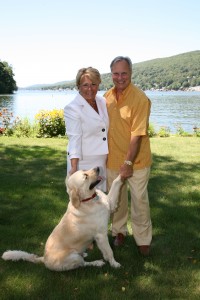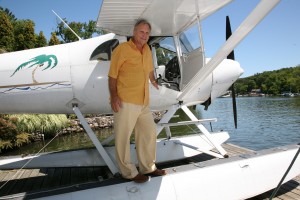The power of pride

Sitting on Barbara and Jim Moore”™s back patio this sunny August day, it”™s easy to see why the couple fell in love with the view. Comfy chairs, wind chimes and a warm breeze off Greenwood Lake add to the relaxing atmosphere. A golden eagle makes a lazy circle in the sky. Suddenly, Max, their golden retriever, breaks the zen with a burst of exuberance as he runs across the patio.
Barbara yells at Max and Jim laughs.
Ahh, life on the lake.
Barbara is the mayor of Greenwood Lake, the quiet hamlet that is nestled in the northern corner of the body of water with which it shares its name.

Jim is managing member of TIF Fund Management L.L.C. He works in an upstairs office of their house that affords a lake-long view into New Jersey. He is quick to point out that Barbara works out of the house as well, saying being “part time” mayor is a fulltime job. “She works 60 hours a week and makes about a dollar eighty-three an hour” for minding the concerns of 3,450 people living in the village”™s two and one-half square miles. She also is a financial adviser ”“ 28 years in the business.
Barbara and Jim Moore complement each other, filling in the gaps that each one modestly leaves out. They are ”“ if you will ”“ each other”™s cheerleader. And they are cheerleaders for the village in which they live.
Their house on the lakefront is the basis of suburban lore.
It was the home of Babe Ruth. (Strike one.)
A passing boater one day pointed out the house as once the weekend home of Robert DeNiro. (Strike two.)
They both agree it”™s fun to hear the legends and don”™t bother correcting the passing boater.
What is true is that Kiefer Sutherland once wanted to buy the house after the Moores had moved in and begun extensive renovations. (They declined the offer.)
Fulltime part-timer
Barbara and Jim are both New Jersey natives, he of Ridgewood and she of Pleasantville, next to Atlantic City. Both met while working for Thomson-McKinnon, a brokerage firm in Manhattan. “Jim, you were the national sales manager for commodities,” Barbara says on his behalf. She was a financial adviser, working out of a building at 37th and Broadway in what was then the heart of the garment district when rack pushers ruled the sidewalks. Those manufacturers and jobs have since been outsourced to Taiwan and other points East.
The brokerage folded shortly after they met. Jim oversaw the transition to the new owner, Prudential Bache. Barbara is about to speak when she is interrupted by a phone call. Jim picks up where he assumes she left off, telling of her experience in commodities, stocks, and bonds and insurance. “She has a great background and it gave her the background to come out here and be a great mayor.”
Off the phone ”“ village business ”“ Barbara says her municipality operates off a $3 million budget that includes 24-hour police department, dispatch, a DPW contracted-service and don”™t even mention unfunded mandates. “And we”™ve done it for the last five years. We”™ve raised taxes very, very little.”
“You show me another municipality in the United states that”™s still in existence that”™s kept its taxes to 1.4 percent over five years; not per year, 1.4 percent over the total of the five years. I don”™t know of any,” Jim says.
“And the people don”™t do without,” Barb says.
But she acknowledges the taxes are high with no industry in town and are borne by residential taxpayers and marinas and restaurants. “We, the village board, realize the assessments have to go up for us to be able to continue the services that we provide and people want.”
The problem the couple says, are the eight taxing authorities ”“ village, county, town, fire, ambulance, library, state and the biggest, school.
But with pride in her community she has been prevailing by applying for grants.
“You can”™t exist on the tax dollar. So you have to work and find grants” applicable to the community, she says.
“You need to understand people to make this work,” Jim adds.
Pride factor
It was “ages and ages” before they finally exchanged marriage vows, Barbara says. They closed on the house, which was in a dilapidated condition, in September 1995. They began renovating it, took time to get married in October, and then went back to fixing the house. That winter 108 inches of snow fell, Jim had a hip replacement and ice wrecked the bulkhead. More work for the newlyweds.
A tangential topic on cities falling into decay in the state, Jim says, “I”™m more of a philosopher who believes that if you don”™t fix it yourself you don”™t appreciate it.”
“I don”™t believe that anybody should really live in a country as wonderful as this and not pay some sort of income tax. …People don”™t appreciate what they don”™t pay for.”
Barbara continues his thought. “But you also have to give the person a ”˜pride factor…”™” “I agree,” Jim interjects. “…to buy into it,” Barbara finishes. “I totally agree,” Jim says.
“That”™s what we did here in Greenwood Lake,” Barbara says. “The people in Greenwood Lake had no access to this lake unless you lived on it or you had a boat at the marina. There was no beach. It was a passion of ours ”“ Jim and I ”“ to share what we have. Because logically what do you do? You want people to have a community. But you don”™t have a community when they get up in the morning, they commute to work, they come back. It”™s just drudgery. They don”™t have community to enjoy what they pay taxes for.”
Through Purchase of Development Rights (PDR) that was paid to the town of Warwick, a recreational site was created for the community, but it was no day at the beach in getting it done. Jim headed up the PDR committee that fought the battle to get a beach where others wanted houses to be built. “But Barbara prevailed.” That was before she mayor, she was a trustee at the time.
Barbara and Jim “laid low” and worked on the house for a couple of years, attending village meetings.
“There was nothing going on. People told us of all the great things that used to happen in Greenwood Lake ”“ boat parades, fireworks,” Barbara says. “That”™s when I got involved. I have to do something. We started a summer concert series. We brought back the triathlon. Also the decorated boat parade.”
“The triathlon money is used for the concerts,” Jim says.
“We have 11 concerts that are free to the public,” Barbara says.
She served on the planning board for two years and Jim was on the zoning board, “but I didn”™t have any political aspirations. I was just sad to see some of the buildings in disrepair.”
Barb was a trustee for two years. “I was passionate and outspoken.” She ran again and lost, but stayed involved in community events and attended village board meetings. She ran again and won. And then she ran for mayor. She now is in her third term.
“I truly enjoy being mayor.”
“Well, the place has improved dramatically,” Jim says. “Just ask the people.”
“The potential of this place is so huge. You know when you move somewhere and you know it”™s home? That”™s how I felt and I still feel that today. This is home and I want everybody in the community to feel community.”
Barb was an extra in a scene from a movie filmed in Greenwood Lake in August. “They have a memorial scene. I”™m listening to Morgan Freeman read this eulogy and he says ”˜Don was a great guy. But he really became better when he moved to the Bell,”™ Bell Island (the fictional place that Greenwood Lake served as.) My heart kind of jumped. The line after that was ”˜There must be something special about this place.”™ And you know, tears came into my eyes. And there is something special about this place.”
Jim says she put the phrase on T-shirts for director Rob Reiner and members of the production company.
Barbara”™s eyes start welling up again with tears.
“She”™s Italian and she”™s emotional,” Jim says.
“Oh, quiet,” she says.